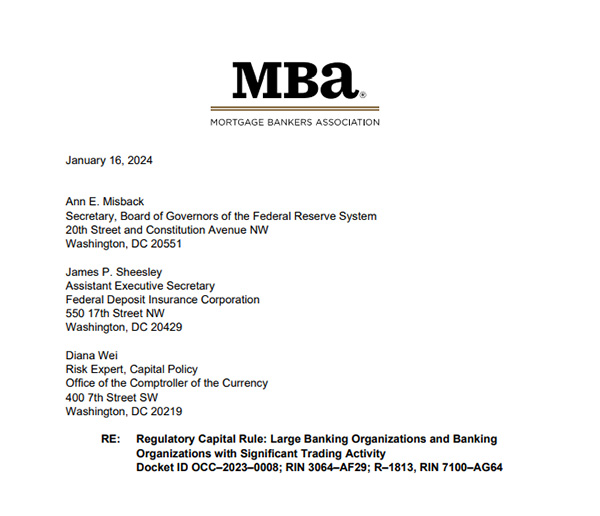
MBA Continues to Cite ‘Substantial Concerns’ in Basel III NPR Comments

Following a joint comment letter with other trade groups submitted last week, the Mortgage Bankers Association also outlined more in depth concerns about the Notice of Proposed Rulemaking regarding the implementation of the final components of the Basel III standards in a separate letter Tuesday.
The NPR was issued by the Federal Deposit Insurance Corp., the Office of the Comptroller of the Currency and the Board of the Governors of the Federal Reserve System
In addition to numerous worries, including the process and intent of the proposed changes, MBA again pointed to specific provisions that would impact the mortgage market, such as:
• The revised risk weighting for residential and commercial mortgages held on a bank’s balance sheet.
• The proposed revision of the cap on MSR holdings that can be reflected in capital for all large banks.
• The increase in the capital conversion factor for any unused portion of a warehouse facility.
MBA also offered specific recommended changes to the overall bank capital framework that would “improve mortgage market participation, liquidity and resilience, and help ensure the continued flow of mortgage credit while reducing costs for consumers.”
The proposed changes included:
• Single Family Residential Mortgage Risk Weights: adopt the Basel III recommended risk weights by LTV and remove the 20 percentage point add-on (“gold plating”); provide credit for private mortgage insurance (PMI) on high loan-to-value (LTV) loans held on a bank’s balance sheet.
• Mortgage Servicing Rights: retain the current 25% cap on MSRs that can be reflected in regulatory capital for category 3 and 4 banks; lower the current punitive 250% risk weight assigned to MSRs for all banks.
• Warehouse Lending: preserve the current credit conversion factor on any unused portion of a warehouse line and reduce the current 100% risk weighting on warehouse lines.
• Commercial Lending: refrain from including an expanded definition of defaulted real estate exposures or define “obligor” to mean only the legal owner of the real estate.
“We strongly urge the agencies to consider the recommendations in this letter, consider the impact to the American dream of home ownership and conduct a more rigorous and thoughtful impact analysis prior to the finalization of any new capital framework,” MBA President and CEO Robert Broeksmit, CMB, stated in the letter. “Our recommendations provide targeted fixes to the proposed capital rule, and address longstanding problems with the current rules, that will strengthen the stability of our housing finance system by incenting large banks to increase their direct and indirect role in residential finance.”
Click here to read the full letter.
